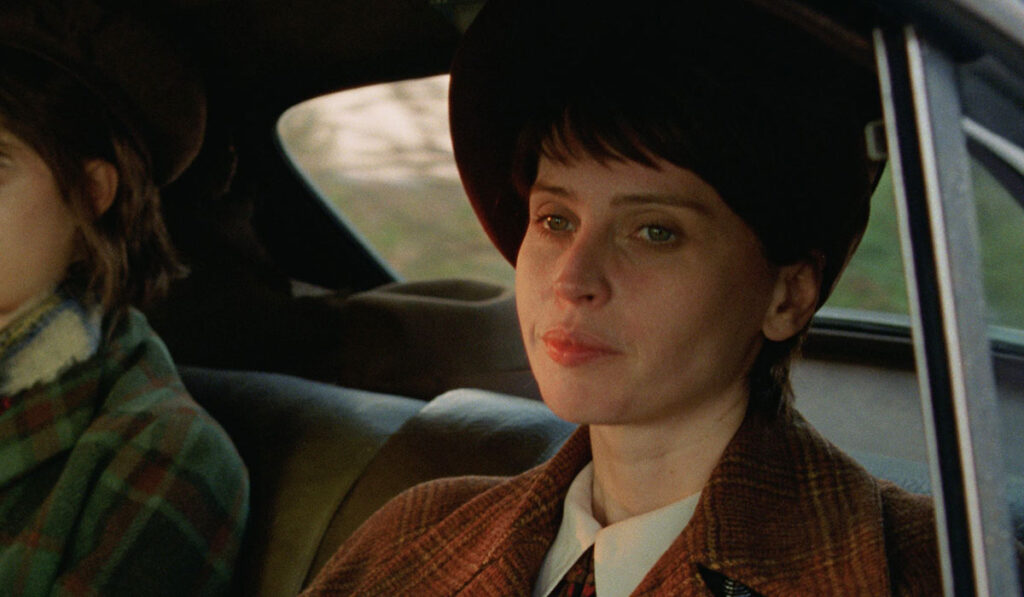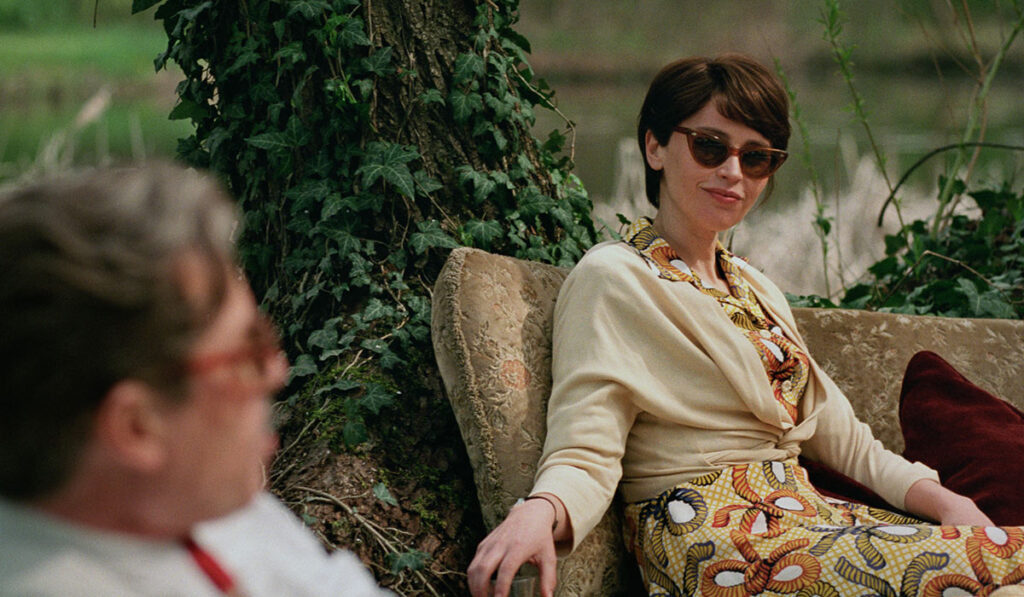Felicity Jones has played her fair share of historical figures. From Jane Hawking in “Theory of Everything” to a young Ruth Bader Ginsburg in “On the Basis of Sex,” she understands the pressure to live up to expectations. Yet, a fictional character, that of Erzsébet Tóth, in Brady Corbet‘s celebrated drama “The Brutalist,” was just as demanding.
READ MORE: Adrien Brody: “I need to constantly be cooking creatively” [Interview]
Erzsébet appears about a little over a quarter of the way through the film. Following WW II, her husband, László (Adrien Brody), has spent almost a decade trying to establish himself enough to fly herself and their niece Zsófia (Raffey Cassidy) to a new life in America. Jones’ character is not only a native Hungarian and disabled but forced, like many immigrants, into circumstances she did not expect.
“I felt as though I had a mountain to climb. I definitely felt like there was a lot for me to do to make sure that the performance was as effortless as possible,” Jones says. “And part of that was understanding what the emotional experiences of these women have been. So, definitely, I felt like it was a huge challenge. And in terms of speaking Hungarian, the dialect, I didn’t undertake the part lightly. I knew that I needed time and focus to really be able to make it feel very naturalistic.”
Throughout our conversation last month, Jones reveals how impressive Corbet was as an actor in another lifetime, the challenges of a small budget and no rehearsal time, her biggest professional challenge in the film, and gives a tease on her next project, “Train Dreams,” which was just selected for the 2025 Sundance Film Festival.
This interview has been edited for length and clarity.
_____
The Playlist: Congratulations on the movie. When the script came your way, what was your initial reaction to it?
Felicity Jones: I thought it was excellent. I had no doubts about doing this. From the moment that I read it to doing it, my agents kept saying, “You’re really into this project.” I was like, “Hell yeah. I love this project.” It was brilliantly written, just intelligent emotionally and structurally. It had these fierce but very human characters at the heart of it, and it was telling a big, big epic story over many, many years. But it was rooted in these very, almost quite sometimes, domestic interactions and was very relatable. What is most important to us? Family love, the pursuit of great art.
When you finally did speak to Brady, do you remember anything from that conversation that stuck with you about the role?
We had a really wide-ranging conversation. I’d actually known Brady socially in my twenties, and I’d always thought he was going to do something quite interesting cause he always seemed to work with these amazing auteurs, and every line of his CV was just an incredible director. And then I caught up with his work, and I liked how sparing he was, how he doesn’t work constantly. You can see how much the films mean to him and how important ideology is to him. So, I thought just speaking to him, I thought, “Oh, he’s going to do something interesting. It’ll be emotional, but also it’ll be cool.” Which the film does. It has this really unexpected spirit to it with the music and some of the edits, and it feels very contemporary.
Did you feel like you needed to research what the life journeys of Hungarian immigrants to the United States were for the role?
I felt as though I had a mountain to climb. I definitely felt like there was a lot for me to do to make sure that the performance was as effortless as possible. And part of that was understanding what the emotional experiences of these women have been. So, definitely, I felt like it was a huge challenge. And in terms of speaking Hungarian, the dialect, I didn’t undertake the part lightly. I knew that I needed time and focus to really be able to make it feel very naturalistic.
One of the most interesting storylines to me is the emotional relationship between Erzsébet and László. They’re such different people when they reunite in the States. Do you think she stays with him because she loves him or is out of some sort of loyalty?
I think there’s a deep, deep connection and love, but I think it is very complicated. I think everything they’ve both been through, the trauma that they have suffered, makes it very, very difficult to build a foundation. And, actually, I loved reading the script when they first meet, they’re quite annoyed with each other almost. It’s quite human. They’re irritating each other even though they’ve been divided for eight years, still in that moment. It’s very human, their interaction, and they’re scared to be vulnerable with each other because the stakes are so high and they’ve waited so long. What if it doesn’t work? What do we do? But I think they are so webbed together that I think they’re going to make it work whatever it takes. I think they believe in each other deeply.

Her character is so fascinating. She had a respected career back in Europe, and then she comes to the US, and she sort of has to rebuild, and she sort of is the breadwinner for quite a while, while he’s not really getting paid or barely getting paid for what he’s doing. Do you feel though restarting her career is important to her even though she’s so far away from her family to do so?
I think she’s really pragmatic, and I think she’s trying to turn her back on the past. You feel that the past is writ large in her body, but mentally and emotionally, she just wants to move forward. So, I think she is not particularly vain. I think she’s just going to make it work. Whatever opportunities she’s given, she’s prepared to make that sacrifice. But I think she realizes that she’s arrived in a new country so she’s got to take every opportunity she can really.
I’m sure every scene is challenging, but was there one you were most focused on before filming began?
The confrontation with Van Buren. I was kind of anxious about that for a really long time before we actually did it, and we didn’t have any rehearsal, but the only thing I did with Brady was just a walkthrough. Her entrance into that scene just to build it. And also, because she’s on with the walker, just how to use the sound of that walker. It’s almost like she’s come knocking, and she’s using the sound of that walker to hail her arrival. She’s kind of saying, “You better listen out.” [Laughs.] “You guys, you think you’ve got it all worked out. I’m here to bring the truth.” But that was the only moment that we actually did before we were on camera. I mean, everything that you see on camera is pretty much the first time that we did it.
It’s incredible how much scope this film has, considering its budget and how little rehearsal time there was. Is that scary? Is that exciting? What is that experience like as an actor?
Petrifying. But what it captures is something. So, it’s like lightning in a bottle. If you get all of those nerves, I mean, it’s exciting to watch. You are actually watching something play in real-time as the audience member. And also it just meant that you really had to look into the eyes of the other actor very deeply and support each other, support each other through it, I guess, at the same time.
Were there any scenes in particular in retrospect that surprised you based on how they played out on screen?
Well, when we did that confrontation scene, the first time that we did it, the shoe came off, which was just completely unexpected. When Erzsébet is thrown down and you just get that moment [where] she’s pretty much being reduced to an animal again, that like everything in the film. So, she has a moment of triumph, but then she’s completely ridiculed at the same time. And I’m sort of careful about how much I watch stuff back. It sort of depends on what the scene is, but Brady actually showed it to us afterward. I’m pretty sure it was the first take. He felt like he’d got it, and then he was so happy that he wanted to show everyone.

Were there many takes on set or was it boom, boom, boom?
Not a lot of takes. It wasn’t partly because it was film, so you just can’t waste it. And because Brady was very clear that he would be shooting the scenes from beginning to end, and he wanted the camera to move, and he didn’t want to keep cutting. So it was almost quite like a play in a way that it was like doing a play without rehearsal that you knew that you just didn’t want to break the take in any way. You didn’t want to fluff your lines or mess up. You have to hold it for those entire takes. Brady very consistently talks you through every scene, and he’s always explaining what’s going to happen. So, even though you haven’t rehearsed it, you’ll feel very confident that you know what he wants and what you are trying to achieve in the scene.
What struck you the most after going through the production experience, and then watching the finished film on screen?
It’s quite an experience, isn’t it? By the end it is weirdly euphoric at the end. I feel when you’ve gone through it, your heart’s kind of racing, and you kind of want to celebrate being alive in some ways when you finish watching it. But I’d seen it twice. So, I watched it when it was unfinished and then saw it finished in Venice. And I just love how ambitious it is and how much scope it has and that it’s really trying to do something completely out there and original. It’s so rare that it’s not a film that’s been made out of fear. It’s been made out of love and determination and just sheer passion for cinema.
Speaking of very talented filmmakers, I know you just shot Clint Bentley’s new movie “Train Dreams.” I was wondering if you could just tease anything about what that experience was like working with that cast and Clint.
It’s a beautiful, beautiful film, a beautiful story. It was completely and very different from “The Brutalist” in its approach. Very much more improvised, and it was very much finding things in the moment. And working with Joel [Edgerton], the camera was rolling, and we were just being, a lot of the times, a very different experience. It’s very meditative. It’s similarly an exploration of America in many ways. So, similar thematically. But the approach was…my scenes are in a log cabin in the Pacific Northwest, in that incredible scenery, in that location. And it’s a very sort of Malik-esque drama, which is very much his aesthetic.
“The Brutalist” is now in limited release.
